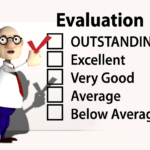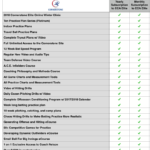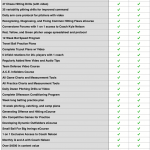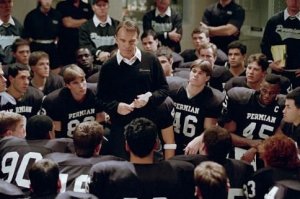Success in Single Elimination Baseball
The secret to single elimination baseball is... there isn’t one. Single elimination baseball often amounts to a very entertaining and exciting coin flip. If one team has a hot pitcher, they win. A single game of baseball can often be decided by luck or chance alone. If Team A has a blooper fall in with the bases loaded and Team B hits a line drive right at the centerfielder with the bases loaded, Team A is likely to win. Not because they were necessarily better, because the ball bounced their way. This is why baseball post season series should be decided by seven game playoffs whenever possible. The new playoff format in MLB is simply a tactic to try to generate excitement for a single elimination game. It has nothing to do with determining who the best team is.
Major League Baseball can control the length of its post season, and can change their series length year by year. For those of us in youth and high school baseball, single elimination tournaments are a reality year in and year out. Inevitably, you will see results in single elimination that bogle your mind, and many of us have been on both end of those mind blowing outcomes. There is certainly no magic potion or formula to ensure that your team is successful in those situations, but there are several things you can do to help your team maximize their performance in single elimination settings:
Get Your Free Pitching Download Here
1.) Don’t change a thing - One of the biggest mistakes coaches make is they change their practice schedule (often practicing longer), get more intense in practice, and cram as many different topics into practice as possible. If you believe those topics are so important that they must be covered at a feverish pace like cramming for a final exam, why haven’t you been working on them all year?
Keep your practice schedule and pre-game routine as consistent as possible. Players need to feel comfortable going into the a single elimination setting and changing their routine can take them out of their comfort zone.
2.) Skip the emotional pre-game speech - Baseball is a much different sport than football, basketball, soccer or hockey. In those sports, you can literally “try harder” than your opponent and gain an edge. In baseball, if players get too emotional, they can lose mental focus and their physical performance can decrease. Imagine a control pitcher who is all geeked up by your pre-game “win one for the gipper” speech, and decides to start throwing fastballs by everyone instead of sticking to what has worked all year. You just got your team all riled up and your shortstop throws a ball away on a slow roller that he had no chance of getting the runner out at first because his emotion was clouding his judgement.
Baseball’s optimal emotion level is a lot closer to golf than football. Baseball is a game of mental focus, the ability to repeat fine motor movements under duress, and quick mental reaction and anlysis. Getting players too emotional can decrease their ability to perform all three of those tasks.
3.) “Saving” pitchers is a risky proposition - The best way to win the championship is to be in the championship game, regardless of what pitching you have left. Having an ace in the hole does you no good if you’re sitting at home during the championship game. Think long and hard before deciding to skip your best pitcher in the first round to save them for a later round. If a few things go wrong, there will be no next round.
4.) Play your game - Don’t change your team’s philosophy in the post season. If you didn’t bunt or run much in the regular season, don’t start now unless you see a particular weakness in the opponent. Your players probably haven’t had much practice executing these skills in the regular season and they will be even more difficult to pull of with the added pressure of the post season.
Likewise, if you ran and played small ball during the regular season, stick with it, even if you get down a few runs. It’s what the players know and they will feel most comfortable playing this way. If you go into a shell, they will sense it immediately, and will likely respond in kind.
5.) Keep your calm - Players will follow your lead. No matter what happens, stay positive, supportive, and keep your focus on each pitch. A 4-0 deficit in the regular season doesn’t sound too large, but a 4-0 hole in single elimination seems insurmountable. It can be if you view it as a 4-0 game. If you can get players to focus on winning one pitch at a time, the comeback is a lot more realistic.
It is also easy begin placing blame on external factors during single elimination games. The last thing you want is your pitcher worrying about an umpire’s call, or a hitter concerned with weather conditions. If you allow external factors to get to you, they will certainly effect your player’s performance on the field.
6.) Don’t remind seniors (or any player) that it could be their last game - We have all been guilty of this one at some point or another. Do you honestly think seniors don’t know that it could be their last game? All this tactic does is put undue pressure on players to perform and ends up decreasing their performance level. Instead of putting large picture pressure on them, allow them to focus on the small battles and responsibilities within the game but placing your focus there.
Single elimination baseball can be a cruel animal, but it is very exciting and pressure packed. Hopefully the tips above help you maximize your team’s performance during single elimination baseball tournaments.
Check Out Our Free Coaching Library Here
More from my site
 CCA Podcast 024: Question and Answer #1
CCA Podcast 024: Question and Answer #1 CCA Podcast 055: How to do a post season program evaluation
CCA Podcast 055: How to do a post season program evaluation CCA Podcast 195 – What to do AFTER you run your hitting assessment
CCA Podcast 195 – What to do AFTER you run your hitting assessment CCA Podcast 178 – Q and A Sneak Peek – What drills should I be doing with my pitchers in the fall?
CCA Podcast 178 – Q and A Sneak Peek – What drills should I be doing with my pitchers in the fall? CCA Podcast 114-5 – FREE drills and videos on Black Friday
CCA Podcast 114-5 – FREE drills and videos on Black Friday 2 Great Opportunities for you During Game 7
2 Great Opportunities for you During Game 7
 Posted by Kyle Nelson
Posted by Kyle Nelson- Posted in Uncategorized
 Oct, 02, 2013
Oct, 02, 2013 No Comments.
No Comments.
Elite members login here
Check out what’s New/Hot!
Recognizing, Diagnosing, and Fixing Common Hitting Flaws eCourse The 3 metrics we tested on Blast motion sensors this year Sneak Peek Inside an Elite Q and A The batting practice continuum Elite Member’s area table of contents 50+ “Chaos” hitting drills
5 sample Chaos hitting drills FREE
Mental Skills and Culture Building The hitting pyramid Welcome Elite Member, Trey! Ideas for a pitcher first practice 12 week bat speed improvement plan Make plans this offseason to have your team playing their best baseball at the end of the year” Top 5 hitting drills to translate practice skill to game performanceHow we used Blast Motion sensors with a team in 2019
What to do if your hitters are overmatched Welcome Elite Member, Tommy! Setting your baserunners up for success Welcome Elite Member, Mike! A consulting call with Elite Member Matt FREE Web Clinic: Developing Athletic, Consistent, Extraordinary Infielders
 Coach Kyle Nelson
Coach Kyle Nelson